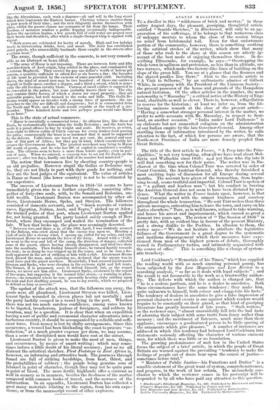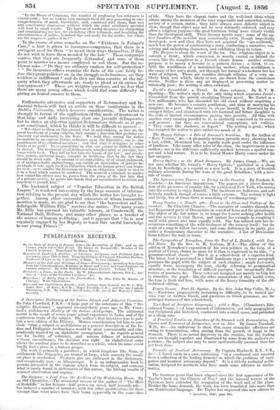AUGUST MAGAZINES. *
To a dweller in this "wilderness of brick and mortar," in these sultry August days, the pleasant, gossiping, thoughtful article entitled Seaside Sketches," in Blackwood, will only be an ag- gravation of his sufferings, if he belongs to that numerous class of unhappy mortals to whom the close of the session brings no relief from hebdomadal toil. Even for that unfortunate portion of the community, however, there is something soothing in the satirical strokes of the writer, which show that many of those who rush to the shore at this season are utterly ig- norant of the best mode of enjoying themselves there. In de- scribing Ilfracombe, for example, he says—" Overtopping the whole town in ugliness and pretension, no less than in altitude, are two terraces, which make two factory-like lines of building on the slope of the green hill. You see at a glance that the flounces and the shaved poodles live there." Akin to the seaside article is "A Visit to Selborne," by an enthusiastic admirer of Gilbert White, in company with the President of the Linnsean Socie
the present possessor of the house and grounds of the Ramps natural historian. Of the other articles in the number, the most noteworthy, is " Macaulay " ; a critical notice of the History of Eng- land, charitable as well as clever. There is, however' a flagellation in reserve for the historian ; at least we infer so, from the fol- lowing. ominous remark at the close of the in article- " Having a somewhat stronger personal interest in the matter, we prefer to settle accounts with Mr. Macaulay, in respect to dcot- land, on another occasion." "India under Lord Dalhousie" is an elaborate but not unmerited eulogium on the administration of our Indian empire by the late Governor-General. Among other startling items of information introduced by the writer, he calls attention to the fact, of which few persons are aware, that the North-west Provinces of India are more densely peopled than Great Britain.
The title of the first article in Fraser, "A Peep into the Prin- cipalities," is not very tempting, after all we have read about Mol- davia and Wallachia since 1853; a...1 yet those who dip into it will find something new for their pains. The writer was in Bu- charest at the time when Colonel Turr was arrested by order of Count Coronini, the Austrian General, who thereby furnished a most exciting topic of discussion for all Europe during several months. The account here given of the transaction, from begin- ning to end, seems truthful and impartial. Colonel MIT is spoken of as a gallant and fearless man "; but his conduct in braving the Austrian General does not seem to have been dictated by pru- dence. What the writer in Fraser insists upon, however, is that Count Coronini acted with the utmost kindness and courtesy throughout the whole transaction. "He sent Purr no less than three private messages, entreating him to leave the town, and carry on his duties elsewhere." Purr, as is well known, refused to take warning, and hence his arrest and imprisonment, which caused so great a ferment two years ago. The review of "The Session of 1856" is pretty fair, with an evident bias in favour of the present Ministry, and a strong dislike to the Peelites. In allusion to them, the writer says—" We do not hesitate to attribute the legislative failures of the Government in a great degree to the systematic and insidious disparagement which their measures have ex rienced from men of the highest powers of debate, thoroug y versed in Parliamentary tactics, and intimately acquainted with the course of office.' lhis is something like a charge of system- atic treachery.
Lord Cockburn's "Memorials of his Times," which has supplied the reading world with so much amusing personal gossip, has been subjected by the Law Magazine and Law Review to a searching analysis, "so far as it deals with legal subjects"; and the result is not favourable to the work as a trustworthy author- ity. The defects with which the author is charged are, that "he is a zealous partisan, and he is a dealer in anecdotes. Both these circumstances have the same tendency ; they make him, quite unknown to himself, both colour and exaggerate his facts." The tendency of dealers in anecdotes to give a false impression of personal character and events is one a.sminst which readers would require to be constantly on their guard, as that kind of gossiping literature has greatly increased of late years. "Such writers," as the reviewer says, almost unavoidably fall into the bad taste of adorning their subject with some traits from fancy rather than memory ; and the merriment of listeners, much more than their applause, encourages a goodnatured person to be little sparing of the ornaments which give pleasure.' A number of instances are adduced in which this tendency had betrayed Lord Cockburn into statements seriously affecting the character of various eminent men, for which there was little or no foundation.
The growing predominance of mob law in the United States forms the subject of a brief article, in which the people of Great Britain are warned against the prevailing "tendency to make the feelings of people out of doors bear upon the course of justice— sometimes before trial."
"Minister of Public Justice—his Functions and Duties" is a sensible statement of the great want of system, comprehensiveness, and progress, in the work of law reform. The melancholy con- clusion to which the reviewer comes in his postscript will be responded to by all who have paid any attention to this question.
• Blackwood's Edinburgh Magazine, No. 490. Published by Blaeknood and Sons. Fraser's Magazine, No. 320. Published by Parker and Son. Law Magazine and Law RerWw, No. 112. Published by Butterworth.. Dublin rnirersity Magazine, No. 284. Published by 11otlges and Co.
"In the House of Commons, the number of professing law reformers is considerable ; but we look in vain amongst them for men possessing at once comprehension of mind, knowledge, and, combined with these, that tact and conciliatory demeanour without which the other attributes specified will lead to small results. The harvest of useful measures for cheapening and consolidating our law, for abolishing effete tribunals, and localizing the administration of justice, is indeed ripe and ready for the sickle ; but where are the reapers to gather it in ? "
In the course of some remarks on the "Evidence in Palmer's Case," a hint is given to insurance-companies that there is a stringent need for them "to mend their ways themselves, if they do not wish to have them mended by the law." These companies confess that they are frequently defrauded, and some of them point to murder as a means employed to rob them. But the re- viewer asks—" Do they use ordinary caution for self-protection ? * • Do insurance-offices examine the facts of the case fairly be- fore they grant policies? or, in the struggle to do business, are they reckless or indifferent ? and do they not thus connive at the im- quity which they afterwards are ready to plead as an excuse for non-payment?' These are weighty questions, and we fear that there'are many young offices which would find some difficulty in giving an honest answer to them.
Enthusiastic advocates and supporters of Reformatory and In- dustrial Schools will find an article on those institutions in the Dublin University, which deserves consideration. The writer is strongly in favour of the application of this mode of treatment to that large and daily increasing class our juvenile delinquents ; but he states an objection against Reformatory Schools as at pre- sent constituted, which he thinks it will be difficult to answer- " We object to them on this ground, that in undertaking, as they do, the penal treatment of young culprits, they assume a function that pertains ex- clusively and inalienably to the State. We hold that, among the duties incumbent by an express Divine ordinance upon the Executive, one is—the punishment of its criminal members ; and that duty it delegates to other hands at its peril ! Its responsibility in this case cannot be shifted, cannot be shared. The treatment of all delinquents, whether adult or juvenile, be- longs solely to it. They fall by law into the hands of the law ; and revela- tion, reason, universal usage, conspire in testifying that by the law they should be dealt with. No amount of accountability, or of sound judgment, or of unimpeachable philanthropy, can entitle an association of private in- dividuals to take upon itself an obligation which no human power can trans- fer to it; or to absolve the Government from an obligation which is tied to it by a bond which cannot be sundered. The moment a criminal, no matter how venial•his offence may be, passes from the grasp of the law into that of a private society, he passes into hands that are unauthorized to detain and impotent to punish him."
The hacknied subject of "Popular Education in the British Empire" is rendered interesting by the large amount of informa- tion relating to the present day which the writer has brought to- gether. Among other successful educators of whom honourable mention is made, we are glad to see that "the benevolent and in- defatigable William Ellis" receives due notice. For many years Ellis 's has pursued his valuable labours, at Camberwell, the National Hall, Holborn, and many other places, as a teacher of the science of human wellbeing ; and it appears that "he is now regularly engaged by her Majesty to teach this useful knowledge to our young Princes !"



































 Previous page
Previous page